|
|
|
Sort Order |
|
|
|
Items / Page
|
|
|
|
|
|
|
| Srl | Item |
| 1 |
ID:
161643
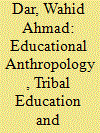

|
|
|
|
|
| Summary/Abstract |
Despite much anthropological research on education in India, the importance of educational anthropology is not properly acknowledged. This article argues for fuller recognition of educational anthropology as a helpful tool to generate well-informed grassroots research throughout India. It connects this argument to concerns that education among tribal and other marginal communities reflects problems over acceptance of diversity. Educational anthropology could help to support sustainable, people-centric educational policies, curriculum construction, and above all better-focused teacher training. Its interventions can provide cohesive glue for nurturing responsible citizenship for all Indians and would facilitate better integration of peripheral tribal communities and other minorities as responsible citizens of a huge nation that claims to be based on respect for composite culture and unity in diversity.
|
|
|
|
|
|
|
|
|
|
|
|
|
|
|
|
| 2 |
ID:
161642
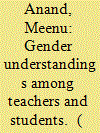

|
|
|
|
|
| Summary/Abstract |
Gender issues are of paramount interest in school education in India, but questions remain about what girls and boys actually learn about gender once they are in school. Are schools really places where teachers effectively combat traditional gender stereotypes among students? Relying on primary research in schools in Delhi, this article examines teachers’ biases and stereotypes regarding gender issues. Comparing this grassroots reality to the opinions on masculinity and femininity held by children in the same schools, the article identifies a need for more focused teacher education. The persistent gaps between tall claims about improved gender awareness, ambitious promises in policies and existing ground realities pose significant educational challenges for India, especially with regard to methods of promoting consciousness about gender-related issues in all domains of education.
|
|
|
|
|
|
|
|
|
|
|
|
|
|
|
|
| 3 |
ID:
161636


|
|
|
| 4 |
ID:
161637


|
|
|
| 5 |
ID:
161639
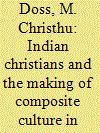

|
|
|
|
|
| Summary/Abstract |
While North India erupted in rebellion in 1857, South India was experiencing a range of cross-cultural contests between missionary Christianity and local converts, who protested against Indian culture being dismissed as a work of the devil. Converts in the emerging Christian communities, particularly in South India, made efforts to retain their indigenous cultural ethos as part of their lived experience. Early attempts to balance Indian identity with Christian beliefs and practices were later replicated in a second anti-hegemonic movement by claims of Indian Christians for respectful inclusion into the new composite nation of postcolonial India.
|
|
|
|
|
|
|
|
|
|
|
|
|
|
|
|
| 6 |
ID:
161638
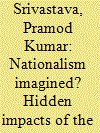

|
|
|
|
|
| Summary/Abstract |
This article challenges the myth that Indian nationalism was a major cause of the Rebellion or Uprising of 1857, arguing rather that nationalism was its ultimate result. But it goes much further, demonstrating that this unsuccessful Uprising of 1857 generated a new consciousness, as it taught Indians about the need to learn to protect and represent themselves better. While the East India Company (EIC) swiftly regained control and transferred sovereignty to the British Crown on 1 November 1858, tightening the noose of colonial subjugation for almost another century, the article argues that significant loss of trust in the feudal lords in 1857 opened the door to a new form of consciousness about the need for more competence in self-rule. The analysis suggests, therefore, that a combination of declining medieval feudalism and growth of modern nationalism in India, guided in due course by better equipped elite members of the middle classes, began to germinate as a largely hidden, unintended consequence of the failure of the 1857 Revolt, a phenomenon noted, but underrated, by historical scholarship.
|
|
|
|
|
|
|
|
|
|
|
|
|
|
|
|
| 7 |
ID:
161641
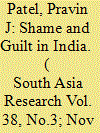

|
|
|
|
|
| Summary/Abstract |
Contemporary Indian society struggles to arrest moral erosion, as traditional social control mechanisms backed by shame have declined. The article argues that unless individual self-control based on a re-configurated morality emphasising shame as well as guilt is sufficiently strengthened, the present negative spiral cannot be reversed. Differences between shame culture and guilt culture are explored to identify how socialisation and education as key mechanisms for transmitting values and morality may be revamped to nurture better consciousness and moral renewal. Educational strategies would need to emphasise duties rather than rights, already reflected in constitutional guidance about Fundamental Duties in the Indian Constitution. Thus, a rational, secular approach that trusts educators to deliver value-based education in India without necessarily strengthening Hindu nationalist tendencies is suggested as a viable way forward.
|
|
|
|
|
|
|
|
|
|
|
|
|
|
|
|
| 8 |
ID:
161640
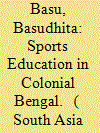

|
|
|
|
|
| Summary/Abstract |
Insufficient attention has been given to studies that relate sports, education and colonial policies in South Asia. Partly based on archival research, this article brings out different perspectives on the introduction of British sports into colonial Bengal as an educational device to produce obedient subjects. Several hegemonic and educational agenda intersected to formulate civilising ambitions. However, these turned out to be only partially successful, since the civilising aims of colonial sports education were constantly undercut by local acts of adaptation and modification. Dramatic evidence of Indians’ sports victories, in due course, severely challenged hegemonic agenda, so that strengthening and educating ‘the natives’ through sports turned out to be a double-edged sword. But this process also gave the Indian subcontinent a unique, exciting sports culture with nationalist colourings.
|
|
|
|
|
|
|
|
|
|
|
|
|
|
|
|
|
|
|
|
|